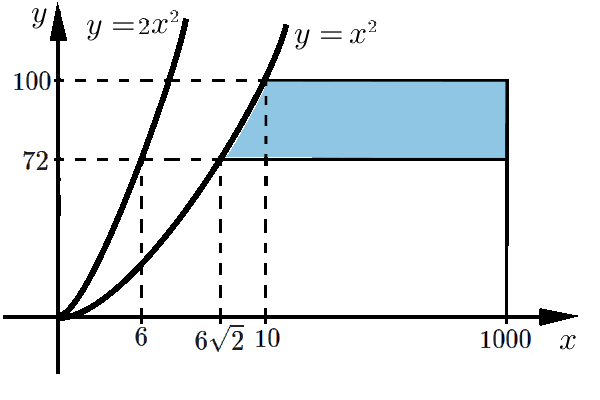MTH3120: Midterm 2 Practice 2
Problem 1.
Assume that \(F\) is the cumulative distribution function of a binomial random variable with parameters \(n\) and \(p\) equal to \(6\) and \(\frac{2}{3}\). Calculate \(F(3)\).
(A) \(\frac{26} { 27}\) \(\quad\quad\) (B) \(\frac{ 233} {729} \) \(\quad\quad\) (C) \(\frac{19}{27}\) \(\quad\quad\) (D) \(\frac{19}{729}\) \(\quad\quad\) (E) \(\frac{ 8 }{ 27}\) \(\quad\quad\) (F) \(\frac{ 64 } {729 }\) \(\quad\quad\) (G) \(\sqrt{2\pi}\)
Problem 2.
If \(X\) and \(Y\) are independent random variables such that \(\mathbb E[X]=5\), \(\mathbb E [Y]=4\), \(\mbox{var}(X)=100\), cacluate \(\mathbb E\left[X\cdot(2X+3Y\right)]\).
Problem 3.
If \(X\) is a standard normal random variable, calculate \(\mathbb E\left[\left(2X+5\right)^2\right]\).
Problem 4.
It is known that \(g:\mathbb R^2\to \mathbb R\) is a positive function of two variables. Let \(T\) be the triangle with vertices \((3,5)\), \((4,10)\), and \((5,17)\). If there exists a constant \(M\) such that the joint density function of random variables \(X\) and \(Y\) satisfies
\begin{eqnarray*}
f_{X,Y}(x,y)&=&\left\{\begin{array}{ll}
\frac{g(x,y)}{M},& \mbox{ if } (x,y)\in T\\
0,&\mbox{ otherwise,}
\end{array}\right.
\end{eqnarray*}
which of the following equalities is correct?
- (A) \(M=\int_{3}^{4}\int_{5+5(x-3)}^{5+6(x-3)}g(x,y)\,dydx+\int_{4}^{5}\int_{10+7(x-4)}^{5+6(x-3)}g(x,y)\,dydx\)
- (B) \(M=\int_{3}^{4}\int_{5+\frac{5}{2}(x-3)}^{5+12(x-3)}g(x,y)\,dydx + \int_{4}^{5}\int_{5+\frac{5}{2}(x-3)}^{17-7(x-4)}g(x,y)\,dydx\)
- (C) \(M=\int_{3}^{4}\int_{17-12(x-3)}^{17-\frac{7}2(x-3)}g(x,y)\,dydx+\int_{4}^{5}\int_{5+5(x-4)}^{17-\frac{7}2(x-3)}g(x,y)\,dydx\)
- (D) \(M=\int_{3}^{4}\int_{17-12(x-3)}^{17-7(x-3)}g(x,y)\,dxdy+\int_{4}^{5}\int_{10+7(x-4)}^{5+6(x-3)}g(x,y)\,dxdy\)
- (E) \(M=\int_{3}^{4}\int_{5+\frac{5}{2}(x-3)}^{5+12(x-3)}g(x,y)\,dxdy+\int_{4}^{5}\int_{10+7(x-4)}^{5+6(x-3)}g(x,y)\,dxdy\)
- (F) \(M=\int_{3}^{5}\int_{5 }^{17}g(x,y)\,dxdy \)
- (G) \(M=\int_{3}^{5}\int_{5 }^{17}g(x,y)\,dydx \)
Problem 5.
It is known that \(X\) and \(Y\) are two random variables whose joint density function satisfies
\begin{eqnarray*}
f_{X,Y}(x,y)&=&\left\{\begin{array}{ll}
Cx^2y,& \mbox{ if } 6 < x < 1000, \; 72 < y < 100, \; \mbox{ and } y \leq 2x^2\\
0,&\mbox{ otherwise,}
\end{array}\right.
\end{eqnarray*}
for some real number \(C\). Which of the following is the correct formula for \(\mathbb P\left(Y\leq X^2\right)\)?
- (A) \(\int_{6}^{5\sqrt 2}\int_{72}^{2x^2}Cx^2y\,dydx + \int_{5\sqrt 2}^{1000}\int_{72}^{100}Cx^2y\,dydx\)
- (B) \(\int_{6}^{5\sqrt 2}\int_{72}^{2x^2}Cx^2y\,dydx + \int_{5\sqrt 2}^{1000}\int_{72}^{100}Cx^4y^2\,dydx\)
- (C) \(\int_{6\sqrt 2}^{10}\int_{72}^{x^2}Cx^2y\,dydx + \int_{10}^{1000}\int_{72}^{100}Cx^2y\,dydx\)
- (D) \(\int_{6}^{5\sqrt 2}\int_{72}^{2x^2}Cx^4y^2\,dydx + \int_{5\sqrt 2}^{1000}\int_{72}^{100}Cx^4y^2\,dydx\)
- (E) \(\int_{6\sqrt 2}^{10}\int_{72}^{x^2}Cx^4y^2\,dydx + \int_{10}^{1000}\int_{72}^{100}Cx^4y^2\,dydx\)
Problem 6.
Provide an example of a probability space \(\left(\Omega,\mathcal F,\mathbb P\right)\) and two random variables \(X\) and \(Y\) on this probability space whose joint cumulative distribution function \(F_{X,Y}\) satisfies \[F_{X,Y}\left( 28, 18\right)= 0.35 \quad\quad \mbox{and}\quad\quad F_{X,Y}\left( 38, 58\right)= 0.78.\]
Problem 7.
The derivative of the moment generating function \(M_X(t)\) of the discrete random variable \(X\) satisfies
\[M_X'(t)=-15e^{-42t}+9e^{42t}+8e^{56t}.\] Evaluate \(14\cdot \mathbb P\left( X \leq 0\right)\).
Problem 8.
Prove that there exists a probability space \((\Omega, \mathcal F, \mathbb P)\) and two random variables \(X\) and \(Y\) on this probability space that are not independent and that satisfy \(\mbox{var}(X)\neq 0\), \(\mbox{var}(Y)\neq 0\), \(\mathbb E\left[X\right]=4\), \(\mathbb E\left[Y\right]=7\), and \(\mathbb E\left[XY\right]=28\).
